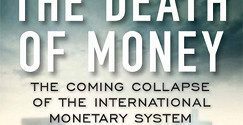The gap between the retirement ‘haves’ and ‘have-nots’ has grown since the recession ended and it is only going to continue growing unless people are provided with enough financial guidance so they can plan accordingly.
Read More »The “Dark Years” Are Coming! Preserve Your Wealth NOW – Here’s How (+2K Views)
The rising gold price is a warning signal for the coming economic crisis.
Read More »Relax: Federal Debt Is Not A Threat To The Economy! Here’s Why
Even though federal debt has soared relative to GDP in the past decade, the burden of the debt is about as low as it's ever been. Still, the growth in debt does reflect some structural problems that are working to keep the economy from achieving its full potential.
Read More »If You Are Not Preparing For a U.S. Debt Collapse, NOW Is the Time to Do So! Here’s Why (9K Views)
Timing the U.S. debt implosion in advance is virtually impossible. Thus far, we've managed to [avoid such an event], however, this will not always be the case. If the U.S. does not deal with its debt problems now, we're guaranteed to go the way of the PIIGS, along with an episode of hyperinflation. That is THE issue for the U.S., as this situation would affect every man woman and child living in this country. [Let me explain further.] Words: 495
Read More »Monetary System Collapse Guaranteed – Here’s Why & How to Invest & Insure Your Wealth Accordingly (+4K Views)
Our monetary system is guaranteed to collapse. The central banks prints money like there is no tomorrow. The governments spends like a drunken sailor and yet inflation is benign and interest rates sit at generational lows. Banks are gaining in profitability while their bad debts are being erased by rising asset prices. What’s not to like? Plenty! This article goes into the details of the money creation process to understand how and why this is happening, what the future implications will be and how to best invest to protect oneself from these eventualities.
Read More »The History of Money – From Gold & Silver to Fiat Currencies (+4K Views)
Today’s monetary system, combined with fractional reserve banking, has a lot of risks. It is vulnerable to bank runs, inflation, and economic bubbles, to name just a few, yet those risks remain invisible to the majority of people. This article provides links to a video and an extended report that provide insights into the question as to why today's paper based money system is doomed to fail and how you can protect against such a collapse.
Read More »A Perspective On the World’s Most Famous Hyperinflation Event (+4K Views)
The Great War ended on November 11th, 1918, when the signed armistice came into effect, but the peace agreement lead to additional destruction - the destruction of wealth and savings - in the form of an hyperinflation event in Germany from 1921 and 1924 that caused millions of people to have their savings erased.
Read More »Understanding Deflation: Bring It On! Here’s Why (+3K Views)
There are two problems with understanding deflation: it is ill defined, and it has a bad name. This article puts deflation into its proper context.
Read More »Hyperinflation Is A Process & It’s Unfolding As Expected (+5K Views)
Hyperinflation is a process clearly defined in history and we are fully entrenched in that process. As much as we enjoy the idea of a free lunch there is no such thing so we will all, eventually, have to pay the piper. Let me explain.
Read More »Is There a Viable Alternative to the Dollar as the Reserve Currency? (+9K Views)
Within the recent retracement of the U.S. currency there has been endless speculation about the future role of the dollar as the world’s primary reserve currency. Moreover, there has even been conjecture that the dollar will no longer exist at some point in the near future but any case made for the vulnerability of the dollar falls short when it comes to naming alternatives. Words: 631
Read More » munKNEE.com Your Key to Making Money
munKNEE.com Your Key to Making Money







